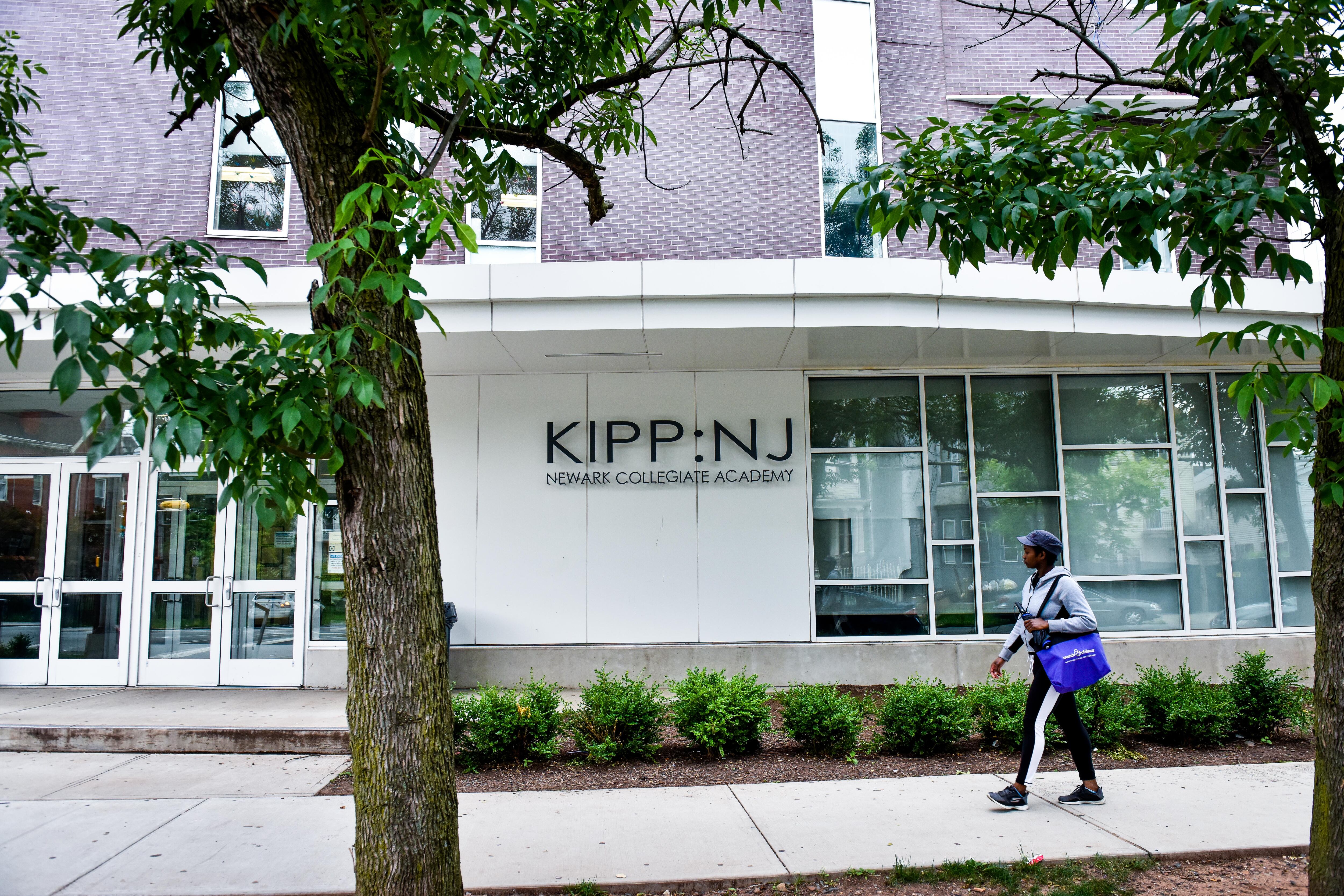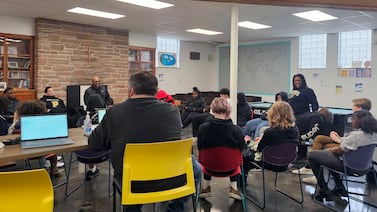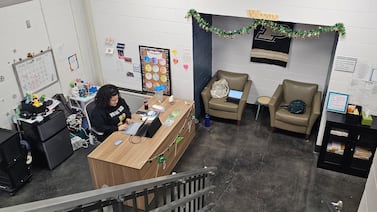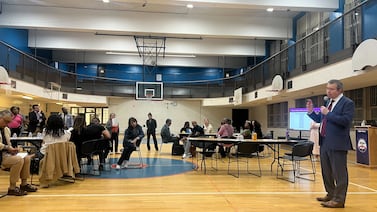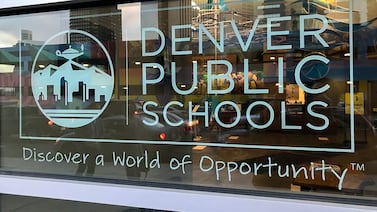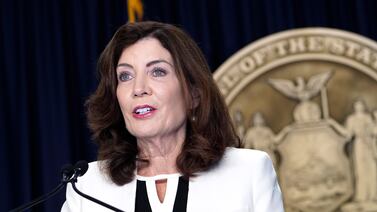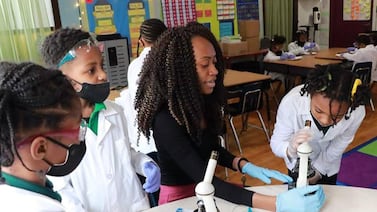Last Friday, a chilling text message flashed on Vernon King’s phone. It was from his daughter’s high school, Newark Collegiate Academy: A student had brought a loaded gun into the building.
The text message informed families the situation was under control. But with little other information, King and other parents still rushed to the scene.
“My daughter, she’s not used to nothing like that,” he said. “So it was very frightening for her and for me.”
KIPP New Jersey, which operates Newark Collegiate Academy and Newark Lab High School, closed both charter schools Monday to review and enhance their safety protocols, a KIPP spokesperson said.
Once again, safety concerns were keeping students home. Only, this time, the threat wasn’t COVID — it was violence.
The return of in-person learning has also meant a return of classroom incidents big and small, from talking out of turn and name-calling to fighting and, on occasion, carrying weapons. Those are perennial challenges, and scant data is currently available to compare this year’s number of incidents to previous years.
Yet, anecdotally, educators nationwide have reported an uptick in disruptive behavior as students readjust to school after spending so much time away. In Newark, parents and teachers say they’ve noticed some students balking at school rules and routines, and clashing with peers verbally or physically.
The pandemic, experts say, is clearly contributing to those behaviors. All students experienced massive changes to their daily lives and relationships over the past year and a half. Many also encountered food shortages, housing instability, domestic or neighborhood violence, or the loss of loved ones. Such hardships can cause trauma, grief, and anxiety — and, sometimes, trigger outbursts in school.
Angela Mincy, superintendent of Marion P. Thomas Charter Schools in Newark, which enroll more than 1,300 students from preschool to 12th grade, said most students are excited to be back among friends and teachers. Yet many are releasing pent-up energy and emotions, and struggling to sit still, follow instructions, or resolve conflicts calmly.
“They are bouncing off the walls,” she said. “It’s like mixing up Pop Rocks and soda.”
Now, Newark educators must ease students back into the routines of school while also, somehow, helping them process the turmoil of the past 18 months and make up for stalled academic progress.
“We want them to learn, obviously,” Mincy said. “But if you don’t get their minds right or have them in a space where they can receive the information, then you can teach, but it won’t land.”
After lockdown, calls for more mental health help
An anonymous tipster last Friday morning alerted KIPP administrators to the gun inside their school.
School leaders immediately called the police and put the school on lockdown. The gun was confiscated, no one was harmed, and families were notified “as soon as possible,” the KIPP spokesperson said.
KIPP officials have not said what prompted the incident. But a ninth grader who said he is in the same class as the student who brought the gun told Chalkbeat the boy had recently been jumped outside of school.
Other students told Chalkbeat they generally feel safe on campus and hadn’t seen other weapons in the building, which until this week did not have metal detectors. When students returned Tuesday, additional security guards were on site and some had hand-held metal detectors.
Javian Castro, a 10th grader at Newark Collegiate Academy, said his classes are going well, but he has noticed his peers getting into conflicts.
“People are arguing and fighting a lot,” he said. “That’s one issue that I don’t like in the school.”
Azuri Gaynor, an 11th grader in the school’s student government, said she and her peers want the school to make student mental health a bigger priority.
“Instead of enforcing uniforms and being strict on that, we should enforce mental health,” she said.
All KIPP high school students can sign up for counseling with a school social worker, the spokesperson said. Teachers have been trained in social-emotional skills such as non-judgmental listening and conflict de-escalation. An external group will present virtual workshops on healthy relationships and safe social media use, and a partner agency offers therapy to families on Medicaid.
“Educators and mental health providers have been sounding the alarm on student mental health for as long as I can remember,” said a statement from Sheyla Riaz, KIPP New Jersey’s director of social work. “The pandemic has added another layer to an already rising trend.”
Safety fears weigh on students
Violence around schools existed long before COVID, but lately it’s gotten worse.
Gun violence has surged in communities nationwide during the pandemic, and shootings are up 23% in Newark this year compared to the same period in 2020. In August, a Newark teenager was fatally shot near his school just days before classes began. And nationwide, at least 30 shootings occurred on school grounds from Aug. 1 to Sept. 15, according to a tally by advocacy group Everytown for Gun Safety — the most school shootings during that period since the group began tracking data in 2013.
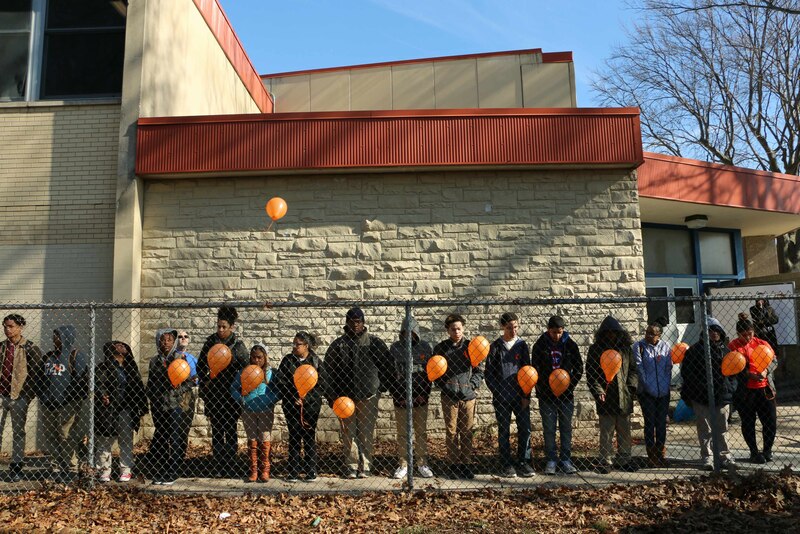
Since classes started in Newark, fights have erupted in and around some schools, according to parents and students. Some of the confrontations stem from online bullying or students struggling with anger management and conflict resolution — longstanding problems that the pandemic has exacerbated, said Yolanda Johnson, a parent organizer whose daughter attends University High School.
“We can’t continue to push these things under the carpet,” she said.
Even just the threat of violence, or knowing people who have been victimized, can do psychic harm to students. Regina Fitch, chief operating officer of the HUBB Arts & Trauma Center in Newark, said her organization tries to help young people recognize those mental wounds.
“That violence you witnessed inside or outside your house, that crime that ended terribly, and you can’t stop thinking about it — that was traumatic,” she said.
Students who fear for their safety, whether in or out of school, can have a hard time focusing on classwork, said Steve Margeotes, executive director of Main St. Counseling, which provides mental health services in seven Newark schools.
“When you don’t feel safe, it’s difficult to concentrate on the task at hand,” he said. “You’re always preoccupied with it, always waiting for the other shoe to drop.”
Dashawn Sheffield knows the feeling. A junior at North Star Academy Washington Park High School, he said hearing about shootings in the news and on social media has put students on edge.
“We could be in class, and we hear police cars go past, and we get scared,” he said. “It creates a lot of tension and results in students walking on their toes, expecting the worst all the time.”
Schools try to help
Violence is just one of many problems that the pandemic has piled on some young people.
Certain populations, including Black and Hispanic Americans, have experienced a “disaster cascade,” as researchers at the University of Washington dubbed it — with COVID, unemployment, gun violence, and racism hitting their communities especially hard. Those racial groups also were more likely than white people to report anxiety and depression during the pandemic.
Young people also experienced a spike in mental health problems. In school, students struggling with mental health might “act out” by disregarding rules or clashing with others, or “act in,” becoming quiet and withdrawn, experts say.
Dashawn, who serves on a student-led wellness committee, said he watched some friendships dissolve and personalities transform during the pandemic.
“A lot of people have changed over this year and a half,” he said, adding that he and his peers have had to relearn some social skills.
Acutely aware of the strain students are under, schools are ramping up support services. They are aided by federal stimulus funds for schools, some of which are earmarked for mental health programs.
Newark Public Schools is rolling out a curriculum focused on social-emotional skills in some schools, and enlisting partner organizations to provide counseling to students who’ve experienced grief, trauma, or other hardships. Marion P. Thomas Charter Schools, which includes three Newark campuses, is training teachers to help students cope with trauma and dedicating time each week for activities that let students socialize and relax, such as dance, sign language, yoga, and chess.
The nonprofit group Newark Trust for Education is helping nine district schools adopt practices that promote social-emotional wellness. Stephanie Parry, the group’s director of P-12 strategy, said the most common request from schools is to connect them with mental health agencies.
“Absolutely they have to outsource — they don’t have the internal capacity to provide mental health services,” she said. “The need is just so great.”


